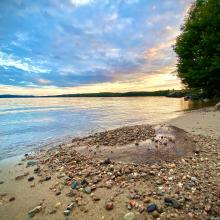Living the Green Life – NYSDEC

[ad_1]
Did you know that?
-
Each day approximately nine billion gallons of water are withdrawn from the lakes, rivers, streams, estuaries and groundwaters of upstate New York (this excludes Nassau and Suffolk counties).
-
The most significant of all water use categories in New York State is thermoelectric power. This accounts for about 59% of total water withdrawn. Next is public water supply at 31%. About 5% of water used is for industrial purposes. Agricultural water use is less than 1% of state-wide water use.
-
A faucet leaking 30 drops per minute wastes 54 gallons a month. See the USGS Drip Calculator. Make sure dripping and leaking faucets and toilets get fixed. Visit DEC’s website for more tips on how to save water indoors, outdoors, and in the workplace.
Be a Friend of the Environment:
Air Quality Awareness Week (AQAW)—is May 6-10. The goal of this week is to promote learning and knowledge so we can move forward to take actions in our daily lives to promote air quality. One step which you can take is to follow DEC’s burn ban which is in effect from March 16 through May 14. Also remember burning trash is illegal statewide in all cases. Following the burn ban and trash burning law are important steps which can be taken to promote clean air for all. Also note, World Asthma Day is on Tuesday, May 7—as warmer weather approaches—keep an eye out for Air Quality Index Alerts.
Spring into planting—looking to plant flowers. Why not create a pollinator garden? Pollinators help our environment, and they can use our help as well – and one way to do that is through growing pollinator-friendly plants. And keep an eye out as National Pollinator Week is typically celebrated in June. Remember, it is not just bees – bats, butterflies, certain birds and more comprise the pollinator community.
Mother’s Day—why not do something for mother earth? From planting a tree to composting to taking part in a local clean-up effort, there are lots of ways to show your love for nature and be a friend of the environment. Read more about volunteer opportunities.
Life’s a picnic—picnicking or barbequing this Memorial Day? Remember to do so with the environment in mind. Avoid disposable paper and plastic products – and don’t forget to set aside beverage containers for return to get your deposits back. Plastic bottles can become clothes, furniture, fencing, and new plastic items – such as bottles and storage containers. Returned aluminum cans can become new cans, gutters, or even car bodies. Aluminum can be recycled repeatedly – helping to save resources and the environment.
Yard sale season—spring is here and that means yard sales. Have items you are looking to get rid of – which still may be useful to others? Then consider having a yard sale. Also, if you have friends and neighbors who are also looking to sell – consider a multi-family or community wide sale as those typically bring in more shoppers. In need of items yourself? Before buying new, look to see if you can find those items at a yard sale. If you conduct a sale and have items left over – remember to donate them to a local charity or thrift store instead of discarding the items in the trash. Reuse and repurpose wherever possible. Another plus – having a yard sale can bring in some money, and shopping at yard sales can result in financial savings. Either way, reusing helps our environment.
Spring cleanup—raking, mowing, tending to trees and bushes are all ways we clean up in the spring from winter’s remnants. Retain clippings and mulched leaves on the lawn-these are natural fertilizers and can help your lawn stay healthy. Setting the mower height at 3.5 inches for taller grass can make your lawn healthier and more drought resistant. Remember not to burn brush—keep our air clean. Many local communities offer curbside pick-up where lawn debris is often composted. Speaking of clean-ups on a larger scale, DEC oversees environmental cleanups year-round of contaminated areas throughout our state as part of the Brownfield Cleanup Program (BCP). Interested in learning more? Check out the BCP program information on the DEC website for local clean-up community updates, fact sheets, and more.
[ad_2]
Read More



